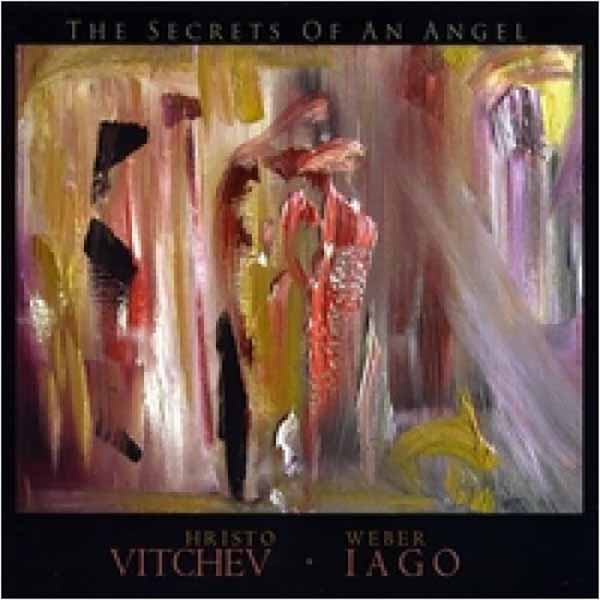
by Ian Mann
April 26, 2010
/ ALBUM
Richly melodic but quietly adventurous duets for guitar and piano. A perfect mood piece and an album of some considerable charm.
Hristo Vitchev and Weber Iago
“The Secrets Of An Angel”
(First Orbit Sounds Music FOSM 121)
Guitarist Hristo Vitchev first came to my attention last year with his quartet album “Song For Messambria”. This was a highly melodic and hugely enjoyable album, inspired in part by the music of Pat Metheny but also drawing on many other influences including Vitchev’s own Bulgarian roots. The quartet’s Brazilian born pianist Weber Iago also brought the music of his native land to the table and the quartet’s blend of accessibility and musical sophistication made “Song For Messambria” one of the most refreshing releases of 2009.
Both Vitchev and Iago are now based in California and “The Secrets Of An Angel” finds them working in a pared down duo situation. Vitchev is a prolific composer and all the pieces on the new album are his. He is also a talented artist and once again the album’s distinctive packaging features his paintings and drawings.
In a sense “Secrets Of An Angel” is the natural consequence of “It Follows” the Vitchev/Iago duet which closed “Song For Messambria”. Once again the focus is on strong melodic and thematic statements but behind the innate tunefulness of Vitchev’s writing there are some sophisticated musical ideas.
Vitchev and Iago have known each other a long time and are clearly comfortable in each other’s company. There is a relaxed, but not bland, quality to their musical conversations as evidenced by the opening “Waltz By Chance Alone” which features Vitchev’s nimble acoustic guitar work and Weber’s flowing piano lines. The pair convince not only as soloists but also as a duo, rarely getting in each other’s way and achieving a kind of effortless empathy.
The beautiful Zima’s poem is slow and measured with Iago and Vitchev making maximum use of space and making every note count. Once again there’s a Metheny like melodic sense and Vitchev’s self acknowledged appreciation of the ECM sound is apparent. It’s unhurried, spacious and very lovely.
Iago’s tinkling opening cadences mimic the sound of running water at the beginning of “When It Rains”. He continues to exhibit a similar lightness of touch throughout the piece, whether it’s as the featured soloist or when underpinning Vitchev’s cleanly picked acoustic guitar. The tune ends as it began with Iago’s impressionistic piano and a brief sound effect of falling rain.
The lively “Haiuri’s Dance” features wordless vocals reminiscent of “First Circle” era Pat Metheny, although neither duo member is actually credited as a singer. However the main delights of the tune are it’s sheer joyousness and the quality of the mercurial guitar and piano solos that are bookended by the sung passages.
After the celebratory mood of “Haiuri’s Dance” the title track is an altogether quieter affair. It’s a fragile ballad paced by delicate guitar and limpid, lyrical piano. As on “Zima’s Poem” every note is considered and seems to hang in the air. The ECM style virtues of space and clarity are present throughout this achingly beautiful piece of music.
“The Last Pirate” is a lengthy composition split into two parts. “Part 1-Amazonian Tales” is primarily a vehicle for Vitchev’s quick fingered yet always tasteful guitar, his two solos being punctuated by some equally fine playing from the always reliable Iago. This is probably some of the densest playing on the record but as always the duo leave plenty of room for each other and they remain the epitome of good taste throughout. “Part 2-The Treasure Of Carmel” is perhaps a reference to the pianist’s current home town. The pianist shines here, both on his own solos and with his brilliant comping behind Vitchev. The closing stages re-introduce the wordless stylings heard earlier and it must be said that melodically the two “Last Pirate” pieces are the equivalent of anything else heard on this frequently exquisite record.
The album ends with “Leka Nosht (Good Night)”, yet another beautiful tune with a gorgeous melody. Iago’s delicately lyrical piano and Vitchev’s pinpoint acoustic guitar end the album on a deliciously elegiac note.
Vitchev’s album notes refer to making an album that he knew would be “a sweet and graceful journey”. No arguments there, this is an album where the overall mood of calm and serenity is rarely broken. Yet this is music that is never bland or wishy washy. The interplay between Vitchev’s guitar and Iago’s piano is always engrossing and the fluidity with which they glide in and out of solos without ever getting in each other’s way is spot on and instinctive.
Vitchev’s tunes are all highly melodic and the duo’s improvising is tightly focussed and always supportive of the compositions. Vitchev and Iago have a rare chemistry and this is an album with the potential to appeal to a wide audience despite the sparseness of the instrumentation. The duo’s rich harmonic and melodic sense gives the music a fuller sound than the instrumentation might at first suggest. If you liked Vitchev’s quartet album or if you’re a Pat Metheny fan give “The Secrets Of An Angel” a listen, it’s a perfect mood piece and an album of some considerable charm.
blog comments powered by Disqus